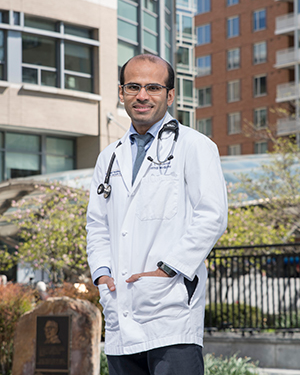Talal Alzahrani, MD, MPH, was always interested in cardiology, particularly in cardiovascular disease. Not long after earning his medical degree from King Abdulaziz University in his native country, Saudi Arabia, the newly minted doctor completed his residency in internal medicine at the George Washington University (GW) School of Medicine and Health Sciences (SMHS), where he found himself an unbeatable opportunity: a cardiology fellowship.
The Cardiology Fellowship is a three-year advanced training program that follows the internal medicine residency. During fellowship, trainees have the opportunity to spend 12 months participating in clinical research. When offered a spot in the program, Alzahrani couldn’t say no. “I chose the cardiology fellowship at GW, simply because it is a great program,” Alzahrani says. “It offers a lot of research and educational — both clinical and non-clinical — resources to its fellows.”

With the luxury of time, Alzahrani has participated in several clinical and basic science studies, some of which have resulted in presentations at national conferences and in published articles. He’s the lead author, for example, of the study “Statin Use and the Risk of Cardiovascular Implantable Electronic Device Infection: A Cohort Study in a Veteran Population,” which looks at how statins may have antibacterial effects that lower the risk for cardiovascular implantable electronic device infection (CIEDI). The research team observed that among patients who received statins following cardiovascular implantable electronic device placement, there was a 66 percent reduction in CIEDI. In November 2017, Alzahrani flew to Anaheim, California, to present his research at the American Heart Association’s Scientific Sessions. Shortly afterward, the study was published in the journal Pacing and Clinical Electrophysiology. Bolstering his studies, Alzahrani says, is his strategy of supplementing his education; he’s completed a master’s degree in public health with mentorship from William Borden, MD, associate professor of medicine at SMHS, and he’s working on another master’s degree in data science from the GW Columbian College of Arts and Sciences. Richard Katz, MD, director of the Division of Cardiology and Bloedorn Chair in Cardiology and professor of medicine at SMHS, has been highly impressed by Alzahrani’s research productivity. “Dr. Alzahrani has outstanding curiosity about advances in cardiology,” he says. “His energy and commitment to clinical research have been outstanding. He has great potential for a future career in academic cardiology.”



